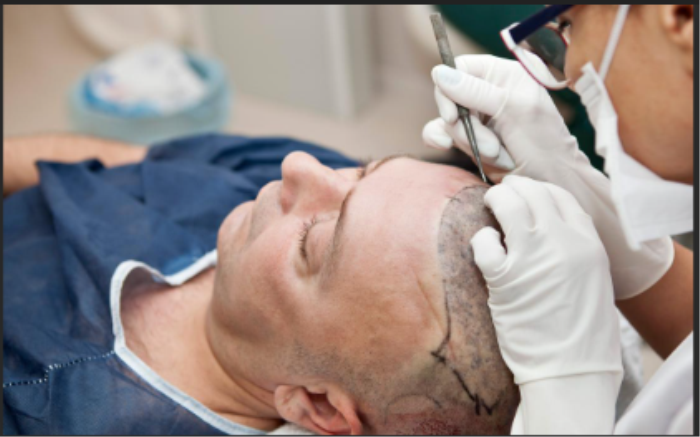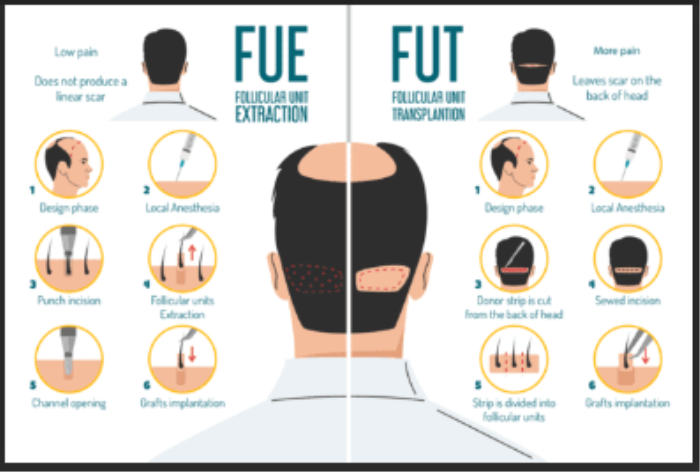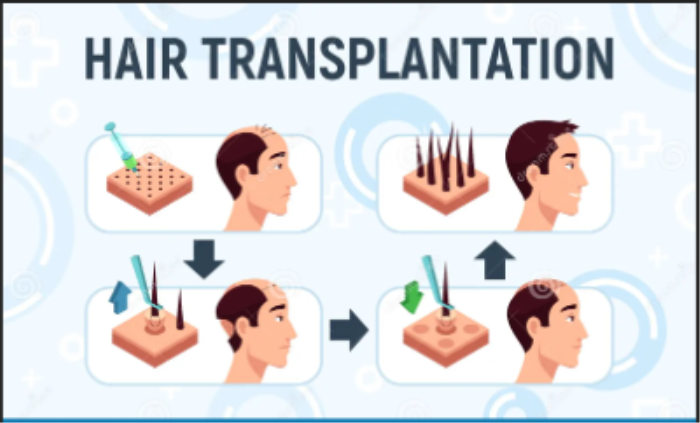Hair transplant surgery in India offers advanced treatments and state-of-the-art techniques for hair restoration. With leading hospitals and skilled surgeons, India provides world-class care and cost-effective solutions for both domestic and international patients seeking effective hair transplant surgery.
Medical disclaimer: This content is for general awareness and does not replace a doctor’s consultation. For diagnosis or treatment decisions, consult a qualified specialist.
Understanding Hair Transplant Surgery
What is Hair Transplant Surgery and How Does it Work?
Hair transplant surgery is a medical procedure aimed at restoring hair growth in areas affected by hair loss or thinning. This surgery involves transferring hair follicles from one part of the body (usually the back of the head) to the balding or thinning areas. Techniques such as Follicular Unit Extraction (FUE) and Follicular Unit Transplantation (FUT) are commonly used to achieve natural-looking results.
During hair transplant surgery, surgeons use advanced tools and techniques to extract and transplant hair follicles. The choice of method depends on factors such as the patient's hair loss pattern and overall health. The procedure is performed under local anesthesia, and patients can often return to their normal activities within a few days.

When is Hair Transplant Surgery Necessary?
Hair transplant surgery is considered when other non-surgical treatments, like medications or topical solutions, have failed to provide satisfactory results. It is suitable for individuals experiencing significant hair loss or thinning due to genetics, hormonal changes, or other factors. The goal is to restore a fuller, natural-looking head of hair and improve self-confidence.
Different Types of Hair Transplant Surgeries
Different types of hair transplant surgeries include Follicular Unit Extraction (FUE), which involves extracting individual hair follicles and transplanting them to the thinning areas, and Follicular Unit Transplantation (FUT), which involves removing a strip of scalp and dividing it into individual follicular units for transplantation. Each method has its own advantages and is chosen based on the patient's specific needs and goals.

The Hair Transplant Surgery Procedure
Pre-Surgery Evaluation Process
The pre-surgery evaluation process for hair transplant surgery involves a comprehensive assessment, including medical history review, scalp examination, and discussion of expectations and goals. Advanced diagnostic tools may be used to assess hair density and quality. This evaluation helps determine the best surgical approach and ensures optimal results.
Choosing the Right Type of Hair Transplant Surgery
Choosing the right type of hair transplant surgery depends on factors such as the extent of hair loss, donor hair availability, and patient preferences. Surgeons assess these factors along with patient expectations to recommend the most effective technique for achieving natural-looking results.
Detailed Surgical Procedure for Hair Transplant Surgery
The detailed surgical procedure for hair transplant surgery involves administering local anesthesia, followed by extracting hair follicles from the donor area. Surgeons then prepare the recipient sites and transplant the follicles using precise techniques. The procedure concludes with post-surgery care instructions to support recovery and hair growth.

Post-Surgery Care and Recovery
Post-surgery care for hair transplant surgery includes following specific instructions for wound care, managing discomfort with prescribed medications, and avoiding activities that may stress the scalp. Patients are advised to attend follow-up appointments to monitor healing and assess hair growth progress.
Top Hospitals for Hair Transplant Surgery in India
Leading hospitals for hair transplant surgery in India include Fortis Memorial Research Institute Gurgaon, Apollo Hospitals Chennai, Narayana Health Bengaluru, and Max Super Specialty Hospital Delhi. These institutions are renowned for their advanced hair restoration techniques and experienced surgeons.
Best Hair Transplant Surgeons in India
India is home to several renowned hair transplant surgeons known for their expertise and advanced techniques. Dr. Bhatti, based in Chandigarh, is highly regarded for his innovative FUE methods and successful outcomes. Dr. Arvind Poswal, from New Delhi, is another leading expert, known for his meticulous approach and personalized care. Additionally, Dr. Rakesh Sethi in Gurgaon has gained recognition for his artistic skills in hair restoration, while Dr. Satya S. Gupta in Mumbai is celebrated for his extensive experience and high patient satisfaction rates. These surgeons are at the forefront of the hair transplant field, providing effective solutions for hair loss.
Success Rates and Survival Statistics for Hair Transplant Surgery in India
Success rates for hair transplant surgery in India are high, with many hospitals reporting over 90% success rates. Patients typically experience significant hair growth and improved appearance following the procedure. These positive outcomes are attributed to advanced surgical techniques and skilled medical professionals.
Legal and Ethical Considerations for Hair Transplant Surgery in India
Legal and ethical considerations for hair transplant surgery in India include ensuring informed consent, maintaining patient confidentiality, and adhering to medical regulations. Hospitals must provide transparent information about risks, costs, and expected outcomes, and ensure that all procedures are performed by qualified professionals.
Cost of Hair Transplant Surgery in India
The cost of hair transplant surgery in India varies depending on the technique used and hospital, generally ranging from ₹50,000 to ₹2,00,000. Factors such as the extent of hair loss and the number of grafts required can influence the final cost, making India a cost-effective option for high-quality hair restoration.
Explore a detailed breakdown of hair transplant surgery cost in India by visiting our in-depth guide hair transplant surgery cost in India.
Preparing for Hair Transplant Surgery
Lifestyle Changes Before Hair Transplant Surgery
Before hair transplant surgery, lifestyle changes may include maintaining a healthy diet, avoiding smoking, and managing any underlying health conditions. Patients should follow pre-surgery guidelines provided by their healthcare team to optimize the success of the surgery.
Medications and Treatments Required for Hair Transplant Surgery Patients
Patients undergoing hair transplant surgery may need medications such as antibiotics to prevent infections and pain relievers to manage discomfort. Post-surgery treatments may include topical solutions or medications to support hair growth and overall scalp health.
Importance of Support Systems and Counseling for Hair Transplant Surgery Patients
Support systems and counseling are crucial for hair transplant surgery patients, as they provide emotional support, help manage expectations, and facilitate coping with recovery. Having a strong support network and access to professional counseling can enhance overall well-being and contribute to a positive surgical outcome.
Life After Hair Transplant Surgery
Recovery Process After Hair Transplant Surgery
The recovery process after hair transplant surgery involves following post-surgery care instructions, managing any discomfort, and attending follow-up appointments. Patients should adhere to the recommended care plan to ensure optimal hair growth and a successful outcome.
Long-term Care and Monitoring After Hair Transplant Surgery
Long-term care and monitoring after hair transplant surgery include regular check-ups with healthcare providers to assess hair growth and scalp health. Patients should continue with any prescribed treatments and lifestyle modifications to support long-term success.
Potential Risks and Complications of Hair Transplant Surgery
Potential risks and complications of hair transplant surgery include infection, scarring, and graft rejection. Careful pre-surgery evaluation and post-operative monitoring help minimize these risks and manage any complications effectively.
Latest Advancements in Hair Transplant Surgery
Minimally Invasive Techniques in Hair Transplant Surgery
Minimally invasive techniques in hair transplant surgery use advanced tools and methods to reduce discomfort and recovery time. Techniques such as robotic-assisted FUE and advanced extraction methods offer benefits like less visible scarring, faster healing, and improved results.
Use of Robotics and Navigation Systems
The use of robotics and navigation systems in hair transplant surgery enhances precision and reduces manual errors. Robotic systems assist in the accurate extraction and placement of hair follicles, leading to better results and fewer complications.
Development of Advanced Hair Restoration Techniques
The development of advanced hair restoration techniques focuses on improving follicle extraction, graft survival, and overall aesthetic outcomes. Innovations such as 3D imaging and enhanced grafting methods contribute to more effective and natural-looking hair restoration results.
Frequently Asked Questions (FAQs) about Hair Transplant Surgery
What is the success rate of hair transplant surgeries in India?
Success rates for hair transplant surgeries in India are generally high, with many hospitals reporting over 90% success rates. Positive outcomes are attributed to advanced surgical techniques and experienced medical professionals.
How long is the hospital stay after hair transplant surgery?
The hospital stay after hair transplant surgery is typically minimal, often just a few hours to a day, depending on the procedure. Most patients can return to their normal activities shortly after the surgery.
What is the cost of hair transplant surgery in India?
The cost of hair transplant surgery in India ranges between ₹50,000 and ₹2,00,000, depending on the technique used, the extent of hair loss, and the hospital. This cost-effectiveness is a key reason why many choose India for hair restoration.
What are the eligibility criteria for hair transplant surgery?
Eligibility for hair transplant surgery depends on factors such as the extent of hair loss, donor hair availability, and overall health. A thorough pre-surgery evaluation helps determine if surgery is the appropriate option.
What is the recovery time after hair transplant surgery?
Recovery time after hair transplant surgery generally ranges from a few days to a couple of weeks, depending on the individual and the procedure. Most patients can resume normal activities relatively quickly.
What are the risks and complications associated with hair transplant surgeries?
Potential risks and complications of hair transplant surgery include infection, scarring, and graft rejection. Proper pre-surgery evaluation and post-operative care help manage and minimize these risks.
How do I find a suitable hospital for hair transplant surgery in India?
To find a suitable hospital for hair transplant surgery in India, consult with your doctor and research top hospitals known for their hair restoration services. Consider factors such as hospital reputation, surgeon experience, and patient reviews.
What kind of post-surgery care is required after hair transplant surgery?
Post-surgery care typically involves following specific instructions for scalp care, managing discomfort with medications, and attending follow-up appointments to monitor progress. Adhering to the care plan is crucial for achieving the best results.
Are hair transplant surgeries covered by insurance in India?
Some insurance plans in India may cover hair transplant surgeries, but coverage can vary based on the policy. It is advisable to check with your insurance provider for details regarding coverage and any potential out-of-pocket expenses.
Where can I find support groups for hair transplant surgery patients in India?
Support groups for hair transplant surgery patients in India can be found through hospitals, online forums, and patient support organizations. These groups offer valuable support and information during the recovery process.